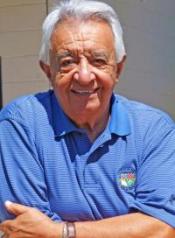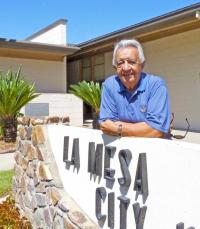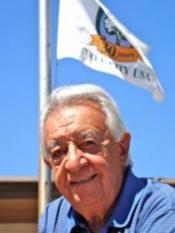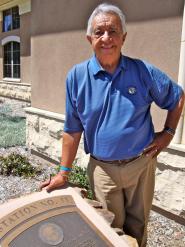More than Forty Years of Public Service

By Kristin Kjaero and Miriam Raftery
In part three of this series on election races in La Mesa, East County Magazine spotlights incumbent Mayor Art Madrid. For this series we asked all candidates the same set of questions based on local issues, with an open invitation to bring up anything else they would like to discuss at the end of the session.
September 6, 2010 (La Mesa) – Ask Mayor Art Madrid about La Mesa and he sounds like a father, proud of his hometown and full of visions for the City’s future.
“Being Mayor is really a full time job," he told East County Magazine. "You can't run or provide leadership to an organization with a total budget $122 million on a part time basis," he said, explaining that the key to getting things done is to “establish professional relationships with the organizations that do the funding.”
Accomplishments cited by Madrid during his 20 years at the City's helm include:
- La Mesa’s “Live Well Initiative” is nationally recognized by the National League of Cities and the National Association of School Superintendents, for its commitment to provide walkability programs, and encourage healthy diets in the midst of a child obesity epidemic.
- The City’s innovative “Rides4Neighbors” program, for which the City received $700,000 in grants from SANDAG and the Grossmont Healthcare District, is a model being studied by other jurisdictions to provide transportation to seniors and the homebound.
- The City has received state transportation grants over $2.5 million which it has used for its “Safe Routes to School” program, to provide safe sidewalks and educational programs.
- A 2 1/4 acre Community Garden is in the planning stages. The City is a leasing site found by Madrid across from Maryland Avenue Elementary, in perpetuity for one dollar a year, with an eye to eventually finding more sites around the City.
- A long needed elevator is being built at the Grossmont Transit Station with a grant from SANDAG and a public-private partnership.
- A task force steering committee of owners in the Village was formed, which has decided to bring forward the concept of a Property Business Improvement District (similar to those in Little Italy and Adams Avenue) for a vote among property owners.
- La Mesa residents have new public safety facilities in the new Fire and Police stations, retrofitted Fire Station #11, thanks to residents passing Prop D.
- Most importantly, in contrast to many other cities, La Mesa has maintained a balanced budget without cuts to services or staff, is actually growing reserves, and has led the way reaching agreement on a two-tiered pension system with two of three employee groups in an effort to head off a pending structural deficit. (The remaining group comes up for negotiations in the spring).
 Madrid has been Mayor since 1990 and served on the City Council since 1981. In a 2001 reference to his many years of service, the San Diego Business Journal dubbed Madrid "The Dean of Local Politics."
Madrid has been Mayor since 1990 and served on the City Council since 1981. In a 2001 reference to his many years of service, the San Diego Business Journal dubbed Madrid "The Dean of Local Politics."
Although it is designated as a "part time" position, he estimates that he spends 60-70 hours per week on City business and local, regional, state, or national organizations from which he identifies potential grants and resources for staff to pursue for projects like the aforementioned.
The Future: Quality of Life Standards and a Vision for the Village
Madrid listed several priorities as the City prepares to celebrate its Centennial.
“Public safety is uppermost in our minds, and we want to address potholes in as timely a manner as efficiently possible,” he said.
Quality of life is a high priority, he added. “Standards here in La Mesa are second to none, and we want to continue to enhance them so people will keep wanting to raise their families here.”
The Village has not had any physical improvements since the late 1970’s, and, like all the City candidates ECM interviewed, he would like to see it spruced up.
Madrid has frequently referred to the Village the heart of the City, and told ECM the he would “never change the character or culture, or community standards.”
He describes his vision for the village as “The same Village with enhanced ambiance and a greater variety of things to do; like what you do with your house, to make it more livable.” He lists Coeur d'Alene, Idaho and Little Italy as examples of the kind of vital community hub he would like to see.
For many years Madrid has contacted businesses to encourage them to relocate here. “A lot of people share our vision, and have made millions of dollars of investments in buying and upgrading buildings,” he said.
The Mayor cites Randall Lamb for refurbished a historical building in the Village and bringing 45 jobs to the city, Millicent and Company hair salon for bringing about 55 employees, and Turpin & Rattan Engineering with another 40 or so employees.
“Gio’s has made a significant investment and is now a destination point for East County. These are some of the things that happen when you talk to people,” he said.
A Lifetime Under Public Scrutiny
 When you run for an elected position, you will be subjected to public scrutiny. Madrid, who began public life as a high school class president in a tiny town, has long been aware of this.
When you run for an elected position, you will be subjected to public scrutiny. Madrid, who began public life as a high school class president in a tiny town, has long been aware of this.
Amid a decades-long career of public service with mostly-positive press, two highly publicized incidents generated controversy.
In 2006, La Mesa resident Chris Tanner implied at a televised Council meeting that the Council and Mayor had allowed ordinances to be violated because of a developer. The City Attorney sent Tanner a letter informing him that there would be a closed Council session to discuss potential litigation for defamation, unless he apologized. When Tanner showed up at the next Council meeting with TV cameras and an attorney claiming that his First Amendment rights had been violated, the Council apologized - except Madrid, who offered to personally escort Tanner to the District Attorney’s office if charges should be brought against anyone for collusion. Tanner did not file charges; neither Tanner nor Madrid ever apologized. The Mayor views the issue as one of civic responsibility. “Freedom of speech is not crying fire in a public theater,” he said. Madrid’s was criticized for his stance by his opponents in the last election, but Madrid won handily.
The second incident occurred in 2008, when police received a call and found Madrid and a City employee intoxicated on a city street. He had met with friends that evening to commemorate the anniversary of his son’s death at age 18 from cancer, then accepted a ride home. New police officers, who did not recognize Madrid, escorted him to his house a block away since he had not been driving. A challenger whom Madrid defeated in the 2006 election, Craig Maxwell, tipped off the San Diego Union-Tribune and extensive media coverage ensued. Madrid apologized publicly, called the incident humiliating, and promised it would never happen again. The next month, his companion was charged with drunk driving in the incident. Maxwell claimed Madrid received preferential treatment, but an independent investigation comparing similar cases cleared the Police Department. The Union-Tribune summed up a packed Council meeting this way: “Indeed, supporters outnumbered critics more than 2-to-1 at a council hearing Thursday to explore whether Madrid received preferential treatment. Madrid wiped away tears as supporters expressed their gratitude. Angry residents got their shots in, but it wasn't the mob it might have been.”
In response to ECM’s questions about the incident, Madrid again expressed his regret. “I have apologized repeatedly to my family, residents, and the city. But I have 40 plus years of involvement, and one incident in 40 years does not define who I am.”
ECM conducts routine background checks of all candidates running for higher offices. A check of court and county records on Madrid turned up one item, a 2007 default on a home. Asked for an explanation, Madrid said he listened to experts who advised missing payments to expedite a refinance, however, after receiving a default notice he made the payments and the default was released.
What does the Mayor do?
 If a man is defined by what he does, then, what exactly does the Mayor do?
If a man is defined by what he does, then, what exactly does the Mayor do?
Madrid represents the City regionally and nationally on numerous organizations, including 23 years on the Board SANDAG, of which he is a past Chairman, and currently sits on its Transportation and Policy Committees. He serves on the State Board of the League of California Cities and its Tribal Task Force, and is past Chair of its San Diego Division. He is past president of the California Association of Councils of Government (CALCOG). He is a member of the National League of Cities, Energy, Environment and Natural Resources (EENR) Steering task force, and the U.S. Conference of Mayors’ Climate Protection Committee.
Highlights of his lengthy public service history include Commissioner of the State of California Fair Employment and Housing Commission, past Chair of the State of California Veterans Board, the San Diego Regional Airport Authority, the boards of Metropolitan Transit Development (MTDB) and Grossmont Community College Foundation, advisory boards to the Chancellor of UCSD and President of SDSU, the County’s Charter Review Commission and U.S./Mexico Border Task Force, as well as four La Mesa Commissions.
Madrid has also volunteered in numerous community service organizations, including positions on the boards of the Make a Wish Foundation, the San Diego Hospice, the United Way, the Old Globe Theater, the San Diego Children’s Museum, and the San Diego Burn Institute Advisory Board. He is Past Chair of the American Red Cross of San Diego and Imperial Counties, and past Vice President of the Cancer Society of San Diego and Imperial Counties.
Madrid was born and raised in New Mexico and came to La Mesa just after high school at the age of seventeen. He joined the Marines right after the Korean War and was stationed in Japan, entering as a private and rising to Sergeant.
“My values and principles were honed by my parents, parochial school, drill instructors and the Marine Corp,” he said.
The Mayor had a career at Pacific Bell for 35 years, of which 33 were in management. He started by delivering mail, and spent the last 17 years as their Director of Government Relations. He retired in December 1991, and has worked full time since as the Mayor of La Mesa.
For more information, visit his website here.
For more stories in our La Mesa Spotlight series, see:
La Mesa Spotlight Part I: Mayoral Challenger Laura Lothian
La Mesa Spotlight Part II: Incumbent Councilman Ernest Ewin
La Mesa Spotlight Part IV: City Council Candidate Patrick Dean
La Mesa Spotlight Part V: City Council Candidate Ian Shiff
La Mesa Spotlight Part VI: Incumbent Councilman Mark Arapostathis
La Mesa Spotlight Part VII: City Council Candidate Kevin Rynearson
Full disclosure: Kristin Kjaero covers the La Mesa beat for East County Magazine and has in-depth knowledge of the City’s issues. She has previously run for City Council, when she received numerous endorsements, including Madrid. Kjaero disclosed this past tie to editor Miriam Raftery, a national award-winning journalist who agreed to coauthor the articles on both Mayoral candidates to assure fair treatment while utilizing Kjaero’s expertise on La Mesa.














Comments
LA MESA SPOTLIGHT: INCUMBENT MAYOR ART MADRID
"Madrid wiped away tears as supporters expressed their gratitude."
Normally one would have to pay for this kind of advertising.
Excellent hagiography!
*slow clap*
Re. Excellent hagiography
Precisely, oopsilon.
This was a laughable puff piece. (1. A journalistic form of puffery; an article or story of exaggerating praise that often ignores or downplays opposing viewpoints or evidence to the contrary.)
And as such was (like the Lothian hatchet-job before it) was a great discredit to ECM.
The facts were well stated in
The facts were well stated in the column. In both cases Ms.Kjaero and Ms. Raftery did a lot of investgating. They told the pros and the cons in the history of both candidates for mayor.
After reading the column, I am wondering why there is so much dislike for Mayor Madrid. Do the preceding comments reflect the same column that I read or are the writers all minions of Mr. Maxwell? Mr. Maxwell ran for mayor against Mayor Madrid and lost. He seems to be a prolific writer but can he read?
The columnists listed some of the accomplishments and qualities of the mayor. They also listed some problems that he had. Ms. Lothian seems like a nice person but she has had many more problems and doesn't seem to be qualified to be mayor. She should run for the council before she thinks that it would be neat to be mayor of La Mesa.
Art Madrid's connections on state and county committees and his seniority has made it easier for La Mesa to receive grant money for needed projects. Maybe Maxwell and his friends don't like the mayors personality but does one vote for a personality. Mayor Madrid has kept the village a village when others wanted to make it a mall. He loves the city he has lived in most of his life. Ms. Lothian has lived in La Mesa for two years.
Who will serve the city better the man who loves La Mesa and wants whats best for it's citizen or someone who has to come up to speed on all areas of city governance?
Re. The facts were well stated in
The "facts" were well stated, Mrs. Anderson. But are they true? If you're really wondering about the rampant dislike for Madrid, please allow me to supply you with a few correctives--i.e., real--facts.
In 2006, Art Madrid and city attorney Glen Sabin sent a letter to La Mesa resident Chris Tanner which (in the words of the San Diego Union-Tribune) accused “him of defaming council members during a Jan. 24 meeting, when Tanner hinted that the city might be cozy with developers. The letter asked for a public retraction and an apology, threatened legal action and promised that the council would discuss the matter in closed session.” The letter accused Tanner of making remarks that were “wholly inaccurate and defamatory – and thereby unacceptable,” In addition, Madrid charged that since Tanner had “made the charge...now he has to prove it.” With the notable exception of Ruth Sterling, the entire council--to their great shame and discredit—jumped on the bandwagon.
But in the end, and to the surprise of only a few, Madrid's threat turned out to be completely hollow. First Amendment lawyers and specialists who examined the letter quickly demonstrated that, not only was his accusation bogus—Tanner had said nothing wrong, and was under no obligation to “prove” anything-- but that Madrid and Sabine had actually laid the city open to the threat of a counter-suit by Tanner, should he choose to file.
Luckily for the sake of the city, Tanner let it go. And after they'd been taken to the legal woodshed, complicitous councilmen, Ewin, Jantz, and Allen, and city attorney Sabin beat a hasty retreat, and quickly (and profusely) apologized to Tanner. But not Art Madrid. No! Putting his own trademark vanity and vindictiveness ahead of the law—ahead of our Constitutional right to free speech!—he resolutely declared that, if given the chance, “he would do it over again.” ECM merely notes that neither Madrid nor Tanner apologized. But, of course, not only is renewing a threat much different from withholding an apology, but one is forced to wonder what Tanner would have even apologized for--exercising his First Amendment rights? Madrid has speciously responded to the charge that he did dirt on free speech by saying that free speech is not really free--that one is not free to, for example, "yell fire in a crowded theater"--as if this hypothetical is even remotely comparable!
Thus, it is no exaggeration to point out that: a) not only has every La Mesan since 2006 been living in the shadow of Madrid's unrepentant, unlawful threat; but that, b) this is the kind of man—one openly contemptuous of our rights when they contradict his pride-- who holds our city's highest elected office.
The "Drunkgate" incident was an especially egregious one in that it involved the honor of the LMPD-- which, sadly, Chief Lanning showed he was willing to compromise for political purposes. Several officers have told me confidentially that the same courtesy would most definitely not have been show to Joe Citizen. And weren't the so-called exculpatory findings of the "independent" investigation cast into doubt by the DA's reopening and successful prosecution of the case?
Chris Tanner is hardly the only person the mayor has bullied. On one occasion, Madrid warned a local businessman that if his friendly relations with me continued, his business would suffer. It did. Almost immediately thereafter the individual in question lost the patronage of several formerly loyal customers who are also friends of the Mayor. How many others have there been? We already know what he's will to do publicly to shut someone up. How far would he go, and with how many, when no one is looking? An Art supporter once mischievously, but admiringly, admitted to me that "Art is our Don Corleone." Is this an appropriate role model for La Mesa?
Journalism vs. Tabloid coverage
Yes it is appropriate to note that neither apologized. You suggest Tanner had nothing to apologize for. He accused city leaders incluing the mayor of having overly cozy relations with a developer, which was denied by Madrid. I was a reporter for another publication at that time and dug deeply looking to see if I could substantiate Tanner's claim. I could find nothing.
Tanner had a right to his opinions but some of his statements appeared to be without substantiation. Some on the council reacted strongly to having their integrity impugned, and in my opinion, there was overreaction by both sides. Tempers got the better of everyone, and an apology by the Mayor could have helped heal this festering sore. Both men had their reasons for choosing not to apologize. My view? Politicians, like journalists, should grow hides thick as a rhinoceros and resist the temptation to allow detractors to provoke a rise out of them.
Whether Madrid was right or wrong is up to voters to decide. However a long-time leader's record should be judged on its totality. We have permitted a robust discussion here including your detailed criticisims, while also being fair to Madrid by including his accomplishments, which happen to be lengthy owing to his many years in office.
As for the second incident, you list unnamed sources as discrediting the investigation. Why didn't these people go public if they had such concerns? None have. As journalists we can only rely on verifiable sources--published reports, people who have spoken on record or directly to our reporters with evidence to back up claims, and articles by other journalists who covered events at the time. To suggest we should someone be aware of unnamed sources hiding in the shadows is just not reasonable.
ECM does not do not do "puff pieces" or "hatchet jobs." We investigate and report on whatever we find. In this race, one candidate's perceived negatives had been widely aired in the media in the past, while the other's came to light for the first time.
You would be surprised how many candidates run for office who have far worse items in their pasts than either candidate in this race, where questions have centered around questions of judgment.
Over my 30-year-journalism career, routine background checks have turned up candidates who lied about military medals and service, academic degrees, businesses they never owned, fake professional credentials, serious financial conflicts of interest, and even criminal pasts--such as a candidate with domestic violence incidences running for a school board. Red flags on those cases were first raised after finding other items in county or court records, leading to discoveries of patterns of deception. Should those things be kept secret, too?
Would you really prefer media that doesn't tell the public the truth about a candidate's past, just because in this race, our research turned up a few items on someone you support? Lothian was given every opportunity to tell her side of the story as well.
We do not delve into muckraking realms, such as who someone is involved with romantically (unless there's a non-prurient public interest, such as a legislator sleeping with a lobbyist). We'll leave that for the tabloids. Our standards are the same as prominent major national newspapers used to be, before the era of budget cuts and slip-shod coverage.
I personally wish each candidate's record would be untarnished, as most are quite personable and have many good qualities, but if there's anything that voters may view as reflections on a candidate's competence, integrity, or judgment, our obligation must be to report the truth.
Craig, I believe that you have good intentions, but perhaps in future if you are recruiting candidates you would do the community a service to vet their backgrounds first. Even major political parties fail to do so these days, and both have been caught backing tarnished candidates that a basic Journalism 101 background check would have revealed.
There is an old saying that you shouldn't run for office if you have anything in your past that you wouldn't want published on the front page. if candidates chooses to run, they know that their life is subject to public scrutiny. Supporters shouldn't blame the media if facts about the person's background make the news.
Speaking of apologizing, it would be refreshing if you would retract your derogatory characterization of our reporting. You have recently praised other reporting we've done for being more in-depth than other publications (on the fires, specifically). Our same philosophy applies to all areas of reporting, from politics to public emergencies -- provide as many facts as we can find for the public to make up their own minds.
Re. Journalism vs. Tabloid coverage
Thank you. Miriam.
You say you could find "nothing" to substantiate Tanner's accusation. First, it must be recognized that not being a detective or investigative journalist, Tanner was under no professional obligation to submit a fully developed inquiry or analysis of the matter before giving his opinion. He is, however, an American citizen. And this, as you know, not only protects but encourages his right to speak freely. Now, I recognize that free speech is hardly synonymous with responsible speech, much less the truth. But given the context in which they were made, Tanner's indirect accusation and the assumptions which led to it were hardly unreasonable.
The Hilltop project had been somewhat controversial from the start. Composed of nearly solid granite, some independent geologists/analysts had concluded that the amount of blasting required to build made it unfit for development in an already crowded residential area. In spite of this, the work proceeded. Not surprisingly, it wasn't long before there were "issues." Noise, dirt and congestion were the least of the problems. Dynamited rock was flying through sky, landing in people's yards and going through their roofs. They were terrified! Immediately they appealed to the developer...from whom they got nothing. They then turned, as is only appropriate, to the city, to their elected representatives, those who had given the green light to the builder in the beginning. And what did they hear? Only what they'd heard before: nothing. Mere hand-wringing, and mumbled suggestions that "this would be looked into." Needless to say, it wasn't. But the blasting continued, and the mounting frustration of the effected folk in the area is what led to their dramatic showdown with the city at council chambers. It was that evening that Chris Tanner, bewildered and hurt by the city's prolonged inaction, spoke on behalf of his neighbors and implied collusion between the city and developer (by in effect saying, "I wouldn't be surprised if you people were in bed with, etc., etc).
What would you have thought, Miriam? What would you have said? What would you have done? Was Chris Tanner really making a baseless accusation? You say you could find "nothing" to "substantiate" what he said. If so, we have different definitions of "nothing." Because I say that when people's lives and property are being jeopardized by unsafe building practices and mute, static politicians, publicly voiced suspicion is not only evidentially warranted, it is morally mandatory. Chris Tanner had the guts to stand-up to a do-nothing mayor and council and suggest what many of us had only suspected. For that he deserves nothing less than our thanks and praise. But that, as you know, isn't what he got.
My account so far, though germane, still hasn't touched the vital point I want to make. By stating that that neither Madrid nor Tanner had apologized your original piece--though factually accurate--implied nothing if not moral symmetry between their respective sides. This is either dishonest or sloppy. But is it really your position? Is that what you believe, Miriam? Because Art Madrid didn't merely use the power of the state to unlawfully threaten a man for exercising his Constitutionally guaranteed right to free speech. No! He, as I mentioned before, later renewed that threat; and not in a moment of passion, not as a matter of immediate emphasis, but after reflection and in full possession of the facts, calmly and coolly said he would "do it again."
The Union-Tribune called his statement "unconscionable" which, if anything, is an understatement. I call it that and a lot more. Certainly it was, by any reasonable standard, disqualifying. Yes, in the heat of the moment we all say things that get us in trouble. But a politician who, for personal reasons, is willing to treat the Constitution with such blatant and premeditated contempt? No; this is entirely unacceptable. Art Madrid's continued presence is not only both an ongoing threat and insult to the citizens he ostensibly serves, it makes a mockery of the mayor's office.
Through his scandalous words and actions, Madrid has put himself in a class by himself among East County politicians. Yet ECM is, for whatever reason, plainly uninterested and/or unwilling to discuss the full range of facts, or the obvious inferences that have arisen in their wake. Why? You rhetorically ask if the people "would...really prefer media that doesn't tell the public the truth about a candidate's past." Of course not. So why would a paper like yours that wants to be credible write the kinds of things that make it appear otherwise? (This was the impression the article has made on a number of people I've spoken with who have no dog in the race). You note that I, "Craig Maxwell, tipped off the San Diego Union-Tribune and extensive media coverage ensued." Would you have preferred that it remain a secret?
You have written that before I begin "recruiting candidates [I, Craig Maxwell] would do the community a service to vet their backgrounds first." But I haven't recruited anyone. So why would you suggest otherwise? Please explain.
Did you "vet" the author of your original piece? Full disclosure notwithstanding, wouldn't a full recusal have been more appropriate? Kristin is, without a doubt, one of Art's most loyal allies.
Nor am I about to reveal the identities of those whose homes, jobs and livelihoods remain within the mayor's orbit of influence. They are afraid of him. And he has already proved that his vindictiveness respects few limits, not even the law of the land.
I look forward to our continued correspondence.
points taken
Craig - I try very hard to keep my own opinions out of my reporting. For the record, I am not a voter in La Mesa, since I live in the unincorporated area, so fortunately don't have to make a choice in this race!
ECM at the moment lacks the budget to hire an army of journalists to cover the multitude of races in East County. We rely in large part on community voulnteers and writers willing to work for nonprofit rates. It is difficult to find enough. (Hint to readers: Donations would help us hire more writers cover more races in East County!)
Kristin was the most qualified person versed in La Mesa issues who was available in a timely manner. I co-wrote the piece and we had many discussions on the wording of various passages. Kristin wanted to be fair, and so I did I. We did note that there were free speech issues raised. We included a link or two for readers who wanted to reference old articles to learn more. Most in La Mesa, of course, are well familiar with these past issues. It's not customary to rehash the complete saga of every political scandal in in-depth detail every time a person's name is mentioned. For instance, I don't dredge up all the details of our local Assemblyman's problems with campaign financing and FPPC fines in every story that we write about him; in his campaign piece we summarized the problem and outcome with links for those who wanted the full background story.
Tanner's concerns for his property are understandable. Your alerting the media was within your rights as a candidate. Our noting that an opponent of the mayor brought this to the public eye is also fair to note. Your concern for free speech is a legitimate point, and I have long been a strong advocate of free speech rights myself (even if a speaker is off-base or voicing a view I strongly disagree with). That's why our site allows a free exchange of ideas from the far left to the far right, requiring only civil discussions (we only censor if language is obscene, defamatory, hate speech, racist, etc.)
We did our best, and if we fell short in your view, we will just have to agree to disagree on those points. I believe you've amply elaborated on points we raised, and by now everyone here has heard both sides in depth. I won't be responding to further attacks on our article.
There are at least two debates coming up on the La Mesa mayoral race, so other media and the public will have opportunities to learn more about both candidates' visions or raise questions about their pasts if they wish.
For what it's worth, I had some journalism friends read both stories, including a national award-winning journalist who is very familiar with La Mesa politics. All agreed the coverage was fair and in fact, complimented us.
Going forward here, I hope to see some discussion here about readers' visions for La Mesa -- we would welcome any fresh ideas of what La Mesa residents would like to see for the City's future as we approach the centennial and beyond. Perhaps whichever candidate wins will take office with som fresh ideas from La Mesa citizens.
Mr. Maxwell, when one
Mr. Maxwell, when one constantly compains they lose their audience. Why not try to get along with the council and mayor for the sake of La Mesa? You could even become an asset to the city.
Re. When one
Mrs, Anderson, When one repeatedly rationalizes wrongdoing, one is invariably thought immoral. Why not call the mayor's actions what they they are? You might even regain a portion of what you appear to lack.